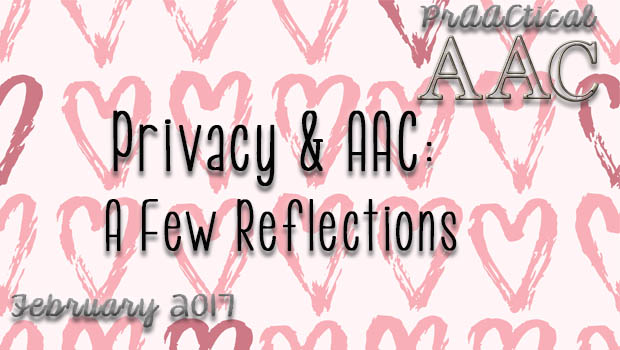Privacy and AAC: A Few Reflections

Helping people become effective communicators through AAC involves having intimate knowledge about them, their experiences, what they like and do, where they go, and how they feel, among other things. In short, we’re privy to information from and about our clients that can be sensitive. There are several privacy implications for our work with AAC learners, some of which is governed by laws and regulations. In this post, we explore some of those issues.
Vocabulary and Message Selection
Until our clients are fully literate or competent with a linguistically robust AAC system, they depend on others to select the words, phrases, sentences, and questions that populate their communication devices/aids. This means that we have to obtain intimate knowledge of their lives in order to know what they might want to say and find ways to provide access to those words. We sometimes end up knowing things about our clients and their families that we’d prefer not to know, quite frankly. We gain intimate knowledge about things that make us uneasy, like information regarding relationships, sexuality, unusual preferences, legal issues, health concerns, and family disputes.
Our ethical and moral codes guide us in using this information, but it’s important to reflect on this weighty responsibility from time to time. We slip up from time to time but the more common problem is probably that we divulge things in ways we assume are harmless. It can be tempting, for example, to share juicy tidbits with trusted colleagues over coffee in the break room. We’re friends, after all, and we all know these clients anyway. No ‘mean girls,’ here. Those of us who’ve experienced cringe-worthy moments where professionals divulged sensitive information without permission to people who don’t need to have that information know first-hand how awkward it is to call out those practices, particularly among colleagues. But we do hard things. We have to.
Data Collection
How would you feel if someone could see a record of everything you said in the last week? Although that record would probably be filled with lots of boring and trivial content, I think most of us would feel uneasy, at best. Depending on the context, we might feel upset, embarrassed, or violated, and we’d do whatever we could to prevent this from happening to us again. It’s important for us to reflect on that as we use the data logging features of AAC systems.
While we applaud the trend toward built-in data collection mechanisms in AAC apps and SGDs, these features must be used thoughtfully. Being able to look into the communication history through data logging gives us powerful information that can be used to adjust the instructional plan to maximize skill development. With this power, though, comes the responsibility of using that information wisely and with the full informed consent of the learner, family, and other key stakeholders. Informed consent, in which we lay out the risks of the feature along with potential benefits, is key. In addition, we can develop procedures to describe these things in clear, jargon-free language and give our AAC clients an active role in the process so that they can give their assent, if they choose, or refuse to have that feature activated on their AAC device. Either way, we honor their preferences. We can’t claim to build communication for independence and self-advocacy on one hand, and then conveniently avoid this issue on the other.
Self-determination
We strive to build communicative competence so that our clients with AAC needs can live the lives they choose. Part of that is empowering them to take control of their own communication systems and things that affect them. Many of us cut our professional teeth under the banner of ‘Nothing about me, without me.’ It’s important the we reflect on how we are building the skills our clients will need to protect themselves, advocate for what they need, and be treated with the respect they deserve. We can probably do a better job teaching concepts like privacy and right of refusal, and help our clients develop skills like protesting, rejecting, reporting, and negotiating.
What Else?
In most cases where we’ve violated an individual’s privacy, we’ve done so with their best interests at heart. We’re not a field populated by mean people who seek to hurt or humiliate others. What’s the harm in a little good-natured gossip between colleagues? Well, for starters, try that one on for size by imagining others talking about you and your issues in the same way. Even if it’s okay with you, though, we can never assume that our clients and their families would feel the same way.
Our good intentions aren’t enough. We play a very powerful role in the lives of people with AAC needs and have to hold ourselves to a much higher standard. Honoring people’s privacy is about self-awareness and trust. Let’s make it a habit to continually review our practices and see where we can improve.
Have you found ways to effectively address privacy concerns in your AAC work? We’d love to hear about them.
Filed under: Featured Posts, PrAACtical Thinking
This post was written by Carole Zangari


1 Comment
Thank you for a very thoughtful column. It is helpful to be reminded of all the ways we can improve the quality of our practice.